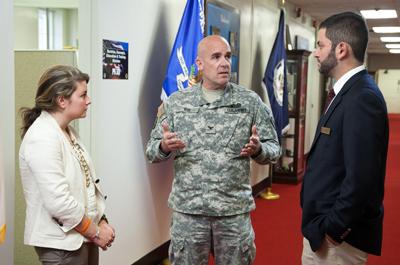Taking the Lead
Dickinson-led program bridges the military-civilian gap
by MaryAlice Bitts-Jackson

A $400,000 Andrew W. Mellon Foundation grant is expanding a Dickinson-led program to help bridge the gap between military and civilian communities. The program fosters long-term educational partnerships among select liberal-arts colleges and military-service academies.
“The idea is to encourage trust and familiarity among future military and civilian leaders by finding practical ways for liberal-arts colleges and nearby service institutions to work together,” says Doug Stuart, professor of political science and international studies, who directs the civilian-military program and is Dickinson’s first holder of an adjunct chair at the War College. “We are building a culture of collaboration that will improve the quality of decision-making in Washington.”
Building on past successes
Dickinson’s leadership role in this project builds on the college’s ongoing efforts to enrich research and coursework in security studies, military science and American policy by pooling academic resources with the nearby U.S. Army War College (USAWC) and other leading service academies. Recent examples include faculty-exchange programs, internships at the USAWC Peacekeeping and Stability Operations Institute, lectures and student-networking opportunities with international officials from the USAWC.
The college institutionalized these efforts in 2002 when it co-established the Gen. Omar N. Bradley Joint Chair in Strategic Leadership. And in 2011, Dickinson received a two-year, $100,000 planning grant from Mellon to take the military-civilian initiative to the national stage.
The launch
The need for better communication between the civilian and military communities in post-draft America arises, at least in part, from the relative isolation of the military community, which comprises only approximately one percent of the total population. In April 2011, Dickinson tapped the collective brain-power of 32 educators and administrators from both sides of the divide when it hosted the first planning meeting for the military-civilian project. The following institutions attended:
Bard College, Colorado College, Dickinson College, St. John's College, Union College, U.S. Air Force Academy, U.S. Army War College, U.S. Military Academy at West Point, U.S. Naval Academy and Vassar College.
Several forums followed, and by the close of the two-year planning phase, Washington & Lee, the Virginia Military Institute and Brown University had joined the project, and initial faculty exchanges and student-faculty programs had emerged at participating institutions nationwide. Project participants also convened at an international conference for the study of political science, security and arms control and developed a model syllabus for a senior-level seminar on U.S. strategy.
Forging ahead
According to Stuart, the most recent Mellon grant, awarded last June, will take the military-civilian initiative to the next level by expanding programming and building the infrastructure to support long-term engagement. Information-sharing platforms, such as video conferences and a military-civilian Wiki created by Associate Professor of Political Science Andy Wolff, facilitate joint student-faculty research. Outreach projects, meanwhile, deepen the pool of knowledge while strengthening inter-institutional ties.
Plans also are in the works to bring students and educators from participating institutions together next year for a civilian-military decision-making simulation that delves into issues relating to national and international diplomacy, politics, ethics and policy.
“We have excellent momentum and we want to build on that,” Stuart says. “There’s a lot of good work ahead, and Dickinson is taking the lead.”
Learn more
Published August 8, 2013